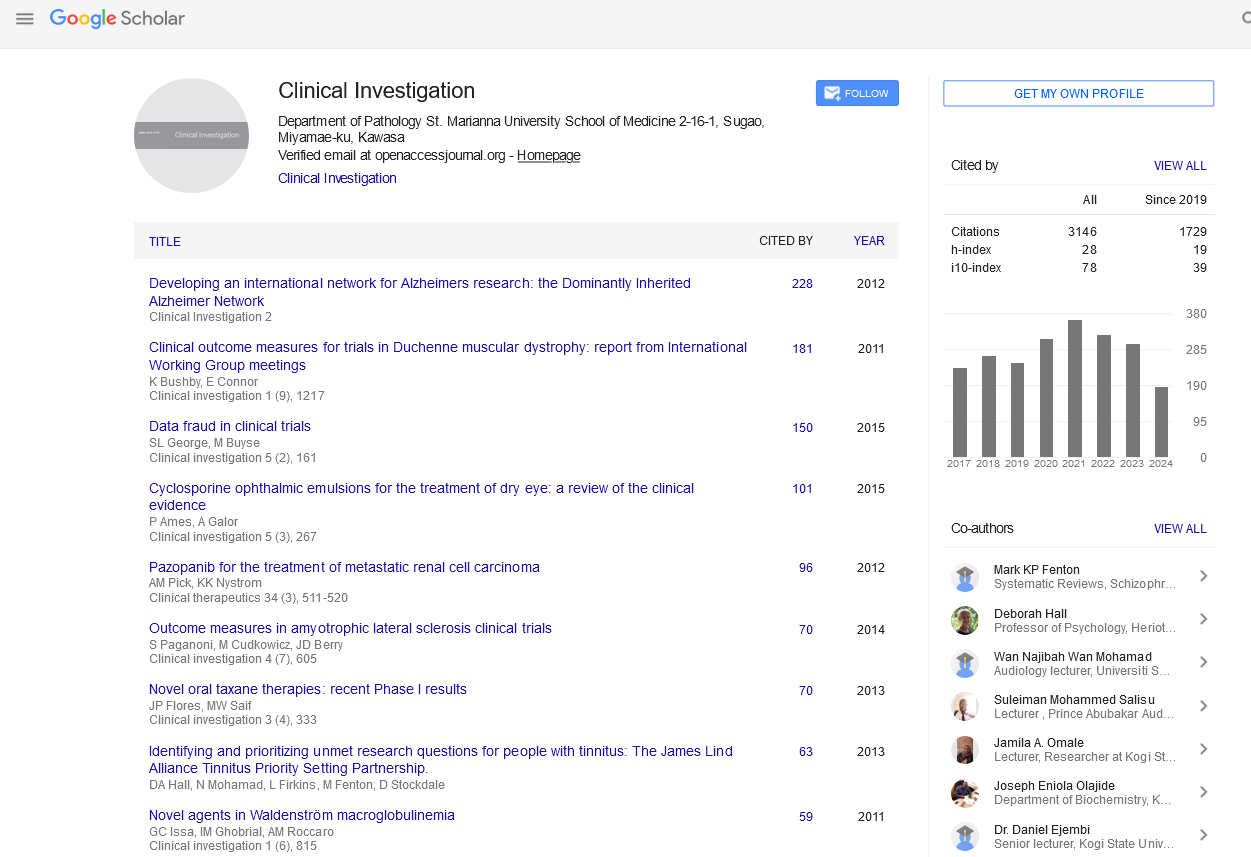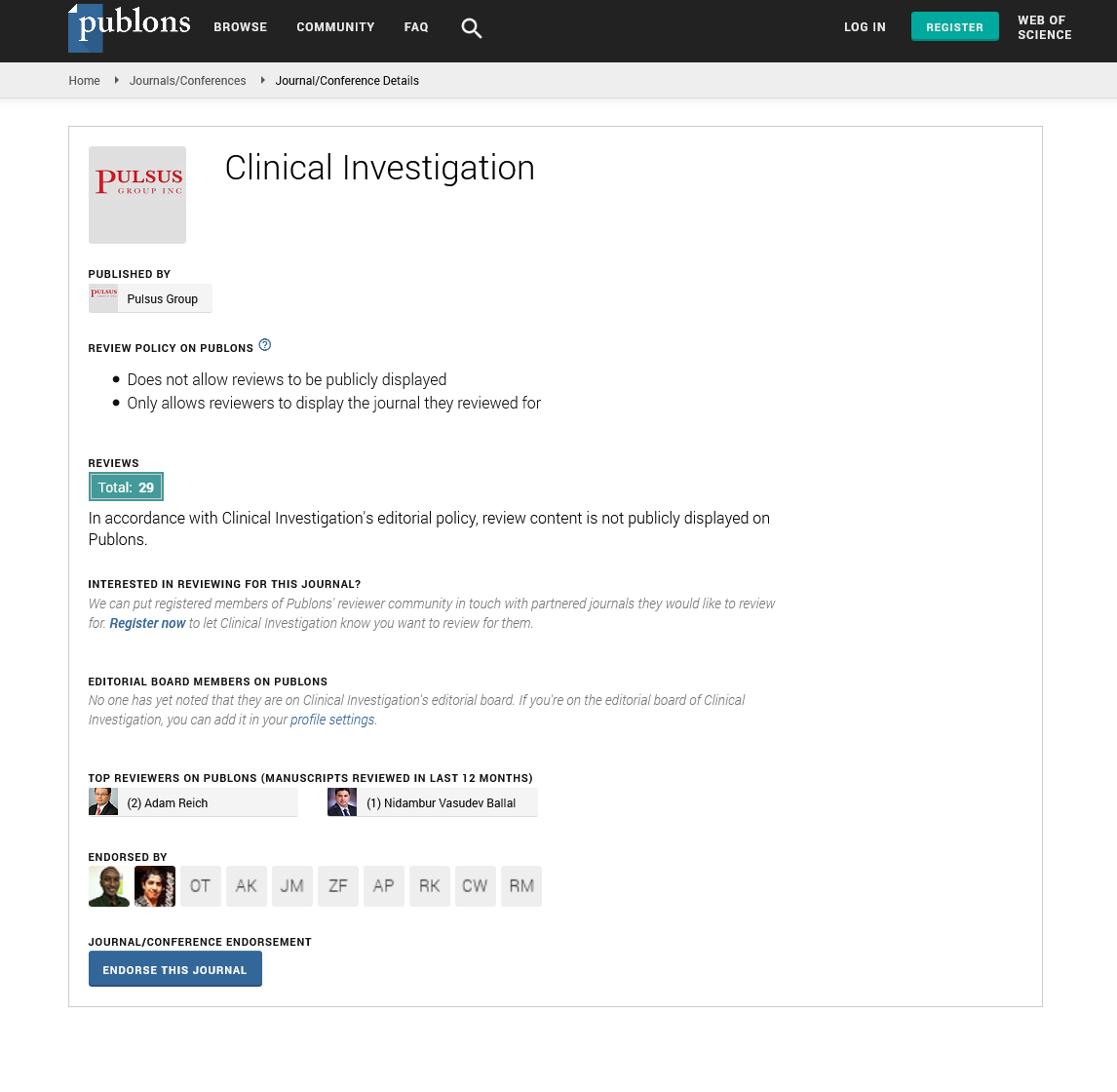Perspective - Clinical Investigation (2024) Volume 14, Issue 2
Exploring the intricacies of neurology: Unraveling the mysteries of the human brain
- Corresponding Author:
- Youeint Sin
Department of Medical Surgery,
Cairo University,
Giza,
Egypt
E-mail: abojo92568@gmail.com
Received: 18-Oct-2023, Manuscript No. FMCI-23-117317; Editor assigned: 20-Oct-2023, PreQC No. FMCI-23-117317 (PQ); Reviewed: 03-Nov-2024, QC No. FMCI-23-117317; Revised: 11-Jul- 2024, Manuscript No. FMCI-23-117317 (R); Published date: 18-Jul-2024, DOI: 10.3752/2041- 6792.2024.14(2).524-526
Abstract
Neurology, the branch of medical science dedicated to the study of the nervous system, stands as a frontier of exploration into the intricacies of the human brain and its multifaceted functions. The nervous system, comprising the brain, spinal cord, and peripheral nerves, plays a pivotal role in orchestrating bodily functions, cognitive processes, and intricate interactions that define human experience.
Keywords
Medical interventions • Exploration • Healthcare • Patient
Introduction
At the heart of neurology lies the enigmatic human brain, an organ of unparalleled complexity. Composed of billions of neurons, each forming intricate connections, the brain serves as the command center for our thoughts, emotions, and actions. Neurologists delve into the realms of neuroanatomy and neurophysiology to fathom the orchestration of this symphony of neurons, seeking to understand the neural circuits that underpin consciousness, memory, and sensory perception.
Description
The Neurological disorders
Unraveling the tapestry of dysfunction: The study of neurology is inseparable from the exploration of neurological disorders. Conditions such as Alzheimer’s disease, Parkinson’s disease, epilepsy, and multiple sclerosis present profound challenges, affecting the lives of millions worldwide. Neurologists employ a combination of clinical acumen, diagnostic imaging, and cutting-edge technologies to unravel the tapestry of dysfunction within the nervous system, aiming to develop effective treatments and interventions.
Neurological examination: Decoding the language of the nervous system.
Central to the practice of neurology is the neurological examination, a meticulous process aimed at decoding the language of the nervous system. Neurologists, often likened to detectives of medicine, assess a patient’s reflexes, coordination, sensory perception, and cognitive function to discern clues about the health of the nervous system. These examinations are crucial in diagnosing and monitoring neurological conditions.
Advancements in imaging technologies: Peering inside the brain.
The advent of advanced imaging technologies has revolutionized the field of neurology. Magnetic Resonance Imaging (MRI), Computed Tomography (CT), and Positron Emission Tomography (PET) provide neurologists with unprecedented insights into the structure and function of the brain. These tools aid in diagnosing conditions, planning surgeries, and tracking the progression of neurological disorders with remarkable precision.
Neuroplasticity: The brain’s adaptive capacity. A fascinating aspect of neurology is the concept of neuroplasticity, which refers to the brain’s remarkable ability to adapt and reorganize itself. Whether recovering from a traumatic injury or learning a new skill, the brain can forge new neural pathways and modify its structure. Understanding neuroplasticity holds promise for developing rehabilitation strategies and interventions to harness the brain’s adaptive capacity.
Epilepsy: Navigating the frontiers of neurological therapeutics epilepsy, a neurological disorder characterized by recurrent seizures, stands as a testament to the ongoing challenges and progress in neurology. Neurologists explore a myriad of treatment options, from antiepileptic medications to innovative surgical interventions such as responsive neurostimulation. The quest for effective therapies highlights the dynamic nature of neurology as a field that continually evolves with scientific and technological advancements.
As our understanding of the brain advances, neuroethics emerges as a critical domain within neurology. Delving into the moral, legal, and societal implications of neuroscientific discoveries, neuroethics grapples with issues such as cognitive enhancement, brain-machine interfaces, and the ethical implications of manipulating neural function. Balancing scientific progress with ethical considerations becomes paramount in the pursuit of responsible and humane neurological practices.
The future of neurology: Integrating technology and compassion. Looking ahead, the future of neurology holds exciting possibilities. The integration of artificial intelligence in diagnostic processes, the development of targeted therapies for neurological disorders, and the refinement of neuro-rehabilitation techniques mark the trajectory of progress. Amidst these advancements, the essence of compassionate care remains central, emphasizing the human dimension in the face of neurological challenges.
A continual journey of discovery. In conclusion, neurology stands at the forefront of medical disciplines, offering a continual journey of discovery into the complex and awe-inspiring realm of the nervous system. From unraveling the mysteries of neurological disorders to harnessing the brain’s adaptive capacities, neurology is a dynamic field shaped by innovation, compassion, and an unwavering commitment to improving the lives of individuals affected by neurological conditions. As technology advances and ethical considerations guide the path forward, neurology remains an ever-evolving frontier where the quest for understanding the intricacies of the human brain continues unabated.
As the field of neurology propels forward, research frontiers open new horizons, promising profound insights into previously uncharted territories. One such area of exploration is neurogenomics, where the intersection of genetics and neurology holds the potential to unravel the genetic underpinnings of various neurological disorders. Understanding the intricate interplay between genetic factors and neurological conditions not only refines diagnostic precision but also lays the groundwork for personalized treatments tailored to an individual’s genetic profile.
Neurodegenerative diseases, including Alzheimer’s and Parkinson’s, pose substantial challenges to healthcare systems globally. The race to develop innovative therapies involves exploring disease-modifying treatments that can slow or halt the progression of these conditions. From investigating novel drug candidates to experimenting with gene therapies, researchers in neurology are pioneering efforts to transform the landscape of care for individuals grappling with neurodegenerative disorders.
Conclusion
A burgeoning field within neurology is neuroimmunology, where the intricate relationship between the nervous and immune systems takes center stage. Conditions such as multiple sclerosis highlight the dynamic interplay between these two systems, prompting researchers to delve into immunotherapies and immunomodulatory approaches to manage and potentially reverse neurological damage. This intersection opens avenues for groundbreaking treatments that target the immune responses implicated in various neurological disorders.
The quest for neurological biomarkers represents a paradigm shift in diagnostic approaches. Biomarkers, measurable indicators of biological processes, offer a glimpse into the physiological changes associated with neurological conditions. From blood-based markers to neuroimaging signatures, the identification of reliable biomarkers holds immense promise for early diagnosis, prognosis, and tracking treatment responses in conditions ranging from stroke to neurodegenerative diseases.


